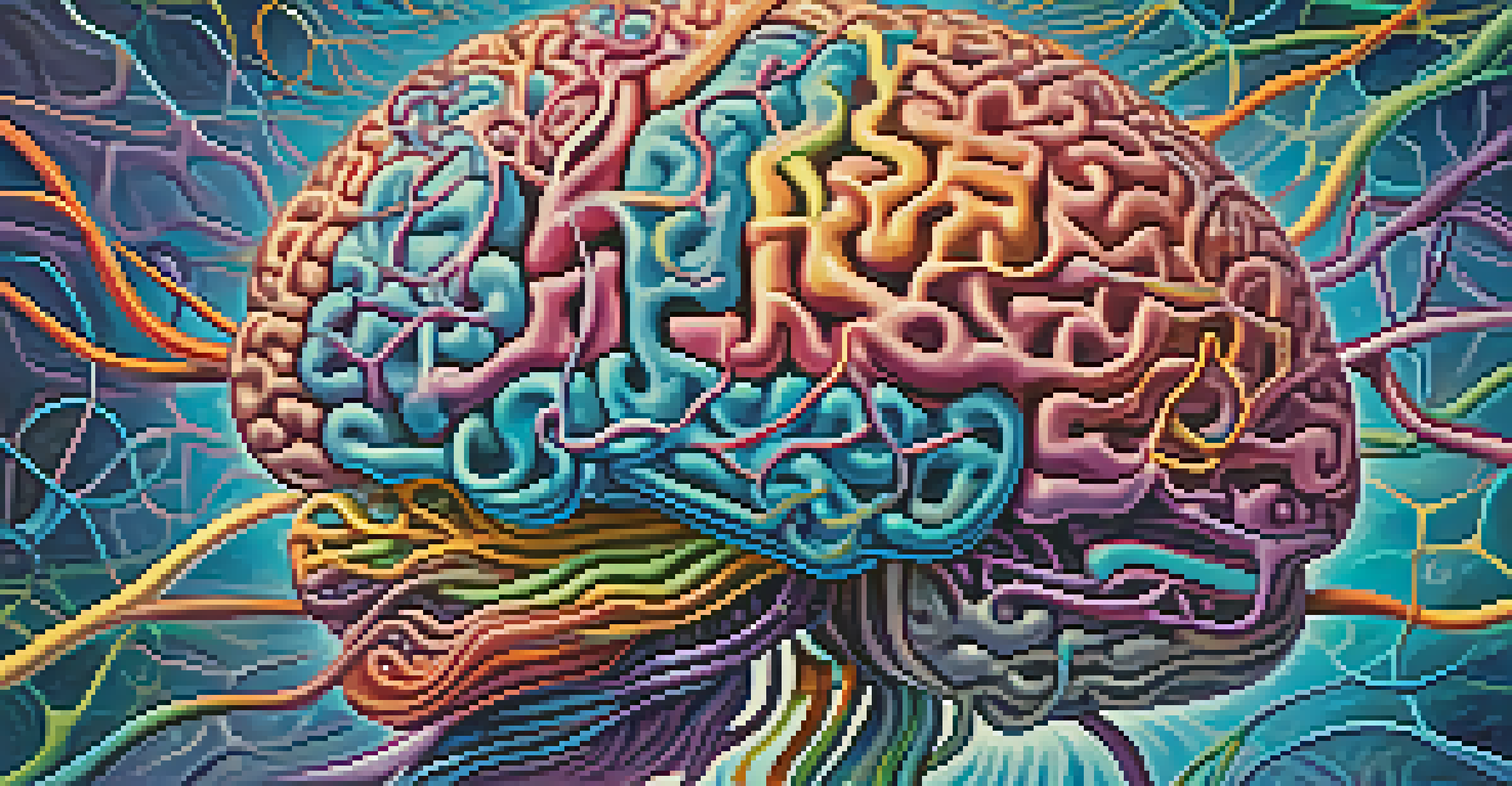Psychedelics and Mental Health: A New Therapeutic Frontier

Understanding Psychedelics: A Brief Overview
Psychedelics are substances that alter perception, mood, and cognitive processes. Common examples include psilocybin, found in magic mushrooms, and LSD, known for its hallucinogenic effects. These substances have been used for centuries in various cultures, often in spiritual or therapeutic contexts, but have recently gained attention in modern medicine.
Psychedelics have the potential to heal, not just the mind, but the soul.
Historically, psychedelics were stigmatized and largely banned, especially during the War on Drugs. However, recent studies are shedding light on their potential benefits for mental health, paving the way for a renewed interest in their therapeutic use. This shift in perception is crucial, as it allows for more open discussions about their effects and applications.
By understanding what psychedelics are and how they work, we can begin to appreciate their potential in treating various mental health conditions. This exploration sets the stage for a deeper dive into how these substances may help individuals struggling with mental health issues.
The Science Behind Psychedelics and Mental Health
Research indicates that psychedelics can facilitate profound changes in brain activity. They often enhance neuroplasticity, the brain's ability to reorganize itself by forming new neural connections. This means that psychedelics might help individuals reframe negative thought patterns, which is particularly useful in conditions like depression and PTSD.

Additionally, psychedelics can induce a state of heightened awareness and introspection, allowing users to confront and process difficult emotions. This therapeutic aspect is akin to having a deep conversation with a trusted friend, where you explore your feelings in a safe space. This could lead to breakthroughs in understanding oneself and addressing core issues.
Psychedelics and Mental Health Benefits
Recent research highlights the potential of psychedelics to treat mental health conditions like depression and PTSD.
Scientific studies have shown promising results, with participants reporting significant improvements in their mental health after psychedelic-assisted therapy. As we delve deeper into this science, it becomes clear that these substances may offer more than just a temporary escape; they could provide lasting healing.
Current Research: Case Studies and Findings
Several recent studies have highlighted the therapeutic potential of psychedelics. For instance, research conducted at Johns Hopkins University demonstrated that psilocybin could significantly reduce anxiety and depression in cancer patients. Participants in the study reported lasting improvements in their emotional well-being, showcasing the power of these substances in a clinical setting.
The mind is not a vessel to be filled, but a fire to be kindled.
Another noteworthy study involved MDMA, which has shown promise in treating PTSD. Participants who underwent MDMA-assisted therapy experienced reductions in symptoms, leading to improvements in their overall quality of life. These findings are not just isolated incidents; they represent a growing body of evidence supporting the use of psychedelics in mental health treatment.
As more studies emerge, they contribute to a broader understanding of how psychedelics can be integrated into therapeutic practices. Each case study serves as a building block, reinforcing the idea that psychedelics may be a key player in the future of mental health treatment.
Psychedelics vs. Traditional Mental Health Treatments
Traditional mental health treatments often rely on pharmaceuticals, which can come with a host of side effects and dependency issues. In contrast, psychedelics may offer a more holistic approach, targeting the root causes of mental health issues rather than merely masking symptoms. This difference in approach is significant for many individuals seeking alternative treatments.
While medications like antidepressants can take weeks to show effects, psychedelics often induce immediate and transformative experiences. For some, this rapid response can be life-changing, providing a sense of relief that conventional methods may not offer. It’s like switching from a slow-moving train to a speedy jet; the journey to mental wellness can feel much faster.
Integration Enhances Therapy Outcomes
The integration process is essential in psychedelic therapy, helping individuals apply their insights for lasting change.
However, it's essential to remember that psychedelics are not a one-size-fits-all solution. They work best in conjunction with professional guidance and therapeutic support, ensuring that individuals navigate their experiences safely and effectively. This balanced approach can lead to the best outcomes for those seeking mental health solutions.
Challenges and Risks in Psychedelic Therapy
Despite the promising research, there are challenges and risks associated with psychedelic therapy. First and foremost is the legal status of these substances; many remain classified as illegal drugs, which hinders research and access. This legal barrier can perpetuate stigma and prevent individuals from exploring potentially beneficial treatments.
Additionally, not everyone responds positively to psychedelics. Some individuals may experience anxiety, paranoia, or overwhelming emotions during their sessions. It's crucial for therapists to screen patients carefully and create a supportive environment to mitigate these risks. Think of it like preparing for an intense hike; proper planning and support can make all the difference in ensuring a safe journey.
As we move forward, it's vital to address these challenges openly. By fostering a culture of education and understanding, we can help ensure that psychedelic therapy is conducted safely and responsibly, allowing more people to benefit from these groundbreaking treatments.
The Role of Integration in Psychedelic Therapy
Integration is a crucial component of psychedelic therapy, referring to the process of making sense of the experiences one has during a psychedelic session. After the initial experience, individuals often need support to understand and apply their insights in everyday life. This is where therapists can play a vital role, guiding clients through their reflections and helping them implement changes.
Much like debriefing after a significant event, integration helps individuals process their experiences and incorporate lessons learned into their lives. This step can enhance the overall effectiveness of the therapy, ensuring that the insights gained lead to positive changes and growth. Without integration, the transformative experience may fade away instead of becoming a lasting catalyst for change.
Future of Psychedelics Looks Bright
As research continues and public perception shifts, psychedelics may become widely accepted as effective mental health treatments.
As we explore the therapeutic potential of psychedelics, it is essential to emphasize integration as part of the process. By prioritizing this stage, we can help individuals truly benefit from their experiences and foster sustainable mental health improvements.
Looking Ahead: The Future of Psychedelics in Mental Health
The future of psychedelics in mental health treatment appears promising, with an increasing number of studies and clinical trials underway. As more research emerges, it’s likely that we will see a shift in public perception and potentially even changes in legislation. This could ultimately lead to a broader acceptance of psychedelics as legitimate therapeutic tools.
Moreover, as mental health continues to gain attention globally, there is a growing demand for innovative treatment options. Psychedelics could fill this gap, offering new hope to those who have not found relief through traditional methods. It's an exciting time for mental health, as we stand on the brink of a new frontier in treatment.

By embracing the potential of psychedelics and supporting ongoing research, we can help shape a future where mental health treatment is more effective and accessible. Whether through therapy or personal exploration, these substances may unlock new paths to healing for countless individuals.